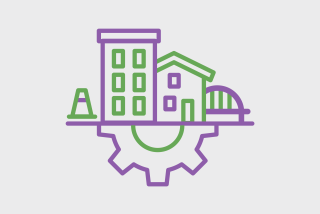Developer Group Balks at Latest Increase in Fees
- Share via
For the first time in memory, Orange County’s Building Industry Assn. has opposed an annual developer fee increase from the agencies building the state’s first toll road project.
Although the hike, to be tacked onto the cost of new homes and development, is somewhat modest, an average 2.4%, the BIA’s board president told the tollway agencies that they had not provided “sufficient information to justify the fee increase.”
Furthermore, “our board members remain concerned about the effect an increase would have on the cost of housing,” said Larry Webb, the president of John Laing Homes, in a letter to the Transportation Corridor Agencies last month.
Orange County’s three new toll roads are funded by tolls, state and federal money and fees on development expected to benefit from the massive $4-billion project.
The BIA, which represents 30,000 to 40,000 members of the real estate community, including home builders, developers, title companies, suppliers and subcontractors, has long enjoyed a good working relationship with the agencies.
In an interview last week, Webb said board members believe the agencies are running such a tight ship that the fee hikes might be avoidable.
“Our concern was that it appeared they were running at a surplus, and perhaps no fee increase would be necessary,” said Webb, a 10-year board member. “Those people are ahead of schedule and under budget, which is positive, so some of us were asking why did they need a fee increase?”
Webb said developers are hit with a variety of new charges each year, from those ordered by parks and schools to sanitation and permit fees. He said such fees sometimes add several thousands of dollars to the cost of new homes.
“We’re not trying to get out of paying fees,” he said. “We’ve just done a ton of studies that show some incredible inequities across the county.”
*
The board’s split vote June 10 to oppose the increase was probably done in haste, say some BIA board members, because the tollway agencies were getting ready to increase the fees three days later and the building group needed to move quickly.
“We probably needed more information, but the reason we were pushed so fast is that their vote was coming up,” Webb said.
The BIA’s transportation subcommittee had already approved the fee increases the week before, after a presentation by tollway officials. But tollway executives did not make a similar presentation to the full board.
On June 13, the boards of the tollway agencies voted unanimously to raise the fees 2.7% for the San Joaquin Hills Transportation Corridor and 2.2% for the Foothill/Eastern Transportation Corridors.
The BIA’s response puzzled some tollway officials, especially because development fees have been increased every year without opposition. Even when fees were increased 30% one year and 42% in another, the BIA was not opposed. The increases are based on the historic average of the California Construction Cost Index, called the consumer price index of highway construction.
“They asked us not to increase the fees, and I don’t know why,” said Wally Kreutzen, the tollway agencies’ executive vice president for finance and administration. “The developers are an integral part of this because they pay development impact fees, which over time are a significant amount of the total revenues generated by the agencies.”
Kreutzen surmised that some BIA board members probably were concerned that the California Construction Cost Index had decreased by 3.4% last year and wondered why their fees were not dropping by that much.
“We need to tell the board that we’re taking an average,” Kreutzen said. “I don’t think some board members were aware of that.”
*
Last month, the tollway board of directors increased development impact fees for new single family homes ranging between $55 and $81 per home and between $32 and $47 per new multifamily home. The fees now range from $2,363 to $3,594 per single-family home and between $1,379 and $2,098 for multifamily homes.
After receiving Webb’s letter, however, some tollway board members said they want to revisit the issue of fees at the board’s August meeting, although they are obligated to repay billions of dollars to bondholders on time.
Meanwhile, toll road officials are scheduled to present their justification for the higher fees at a BIA board meeting today.
“We have an obligation to the people who are paying for these roads, whether they be by tolls or through development impact fees,” said Patricia C. Bates, the mayor of Laguna Niguel and member of the tollway agencies. “If we reach a plateau where we do have a surplus of funds, then we should return the bounty to the consumer.”
More to Read
Sign up for Essential California
The most important California stories and recommendations in your inbox every morning.
You may occasionally receive promotional content from the Los Angeles Times.













